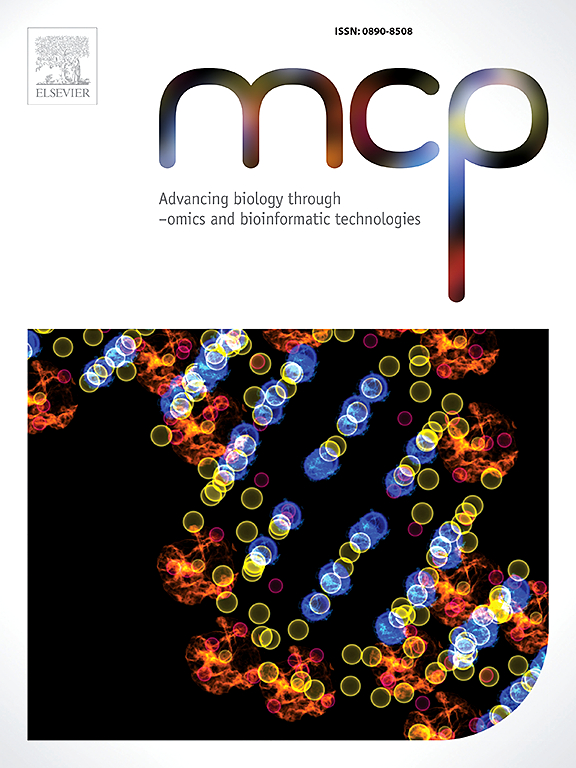SQLE promotes osteosarcoma progression via activating TGFβ/SMAD signaling pathway
IF 2.3
3区 生物学
Q3 BIOCHEMICAL RESEARCH METHODS
引用次数: 0
Abstract
Background
The prognosis of advanced osteosarcoma (OS) has remained stagnant in last decades, requiring the identification of novel therapeutic targets. Recently, much attention was paid to the role of squalene epoxidase (SQLE), a rate-limiting enzyme in cholesterol metabolism, in the field of oncology, while the specific role of SQLE in OS has not been sufficiently elucidated. The present study aims to investigate the role of SQLE in the progression of OS and explore the potential mechanisms.
Methods
The expression levels of SQLE in OS tissues and adjacent normal tissues were compared using bioinformatic methods and experiments. Kaplan-Meier survival analysis and univariate and multivariate Cox analysis were performed to detect the association of SQLE expression and patient’ prognosis. Stably cell lines with SQLE knockdown or overexpression were constructed by lentivirus infection. CCK-8, colony formation, scratch healing, and Transwell invasion assays were carried out to explore the effect of SQLE knockdown or overexpression on the proliferation, migration, and invasion of OS cells. Gene set enrichment analysis was conducted to reveal signaling pathways associated with SQLE expression. The effect of SQLE on TGFβ/SMAD signaling pathway were explored by Western blot assay.
Results
Here, we found a notable rise of SQLE expression in OS tissues and cell lines. Survival analysis showed that individuals with high SQLE expression had a lower median overall survival time compared to those with low SQLE expression. Univariate and multivariate Cox regression analyses showed that SQLE might have the potency to serve as an independently prognostic biomarker in OS. Loss- and gain-of-function experiments indicated that silence of SQLE suppressed OS cell proliferation, migration, and invasion, while overexpression of SQLE exerted the opposite effects. Mechanistically, TGF-β signaling pathway was identified as the downstream pathway of SQLE through bioinformatic methods, and the results of Western blot assay showed that SQLE positively regulated the activity of TGFβ1/SMAD2/3 signaling in OS. Resue experiments demonstrated that SB431542, a small molecule that inhibits TGFβ/SMAD signaling, could partly reverse the promoting effects of SQLE on OS cell proliferation, migration, and invasion.
Conclusion
Our results provided preliminary evidences that SQLE was a tumor-promoting factor and prognosis predictor in OS. SQLE promoted OS cell proliferation, migration, and invasion via activating TGFβ/SMAD signaling and targeting SQLE might be a potential strategy for the treatment of OS.
SQLE通过激活TGFβ/SMAD信号通路促进骨肉瘤进展。
背景:在过去的几十年里,晚期骨肉瘤(OS)的预后一直停滞不前,需要寻找新的治疗靶点。近年来,角鲨烯环氧化酶(SQLE)作为一种限制胆固醇代谢的酶在肿瘤领域的作用受到了广泛的关注,但SQLE在OS中的具体作用尚未得到充分的阐明。本研究旨在探讨SQLE在OS进展中的作用,并探讨其可能的机制。方法:采用生物信息学方法和实验方法比较SQLE在OS组织和相邻正常组织中的表达水平。采用Kaplan-Meier生存分析、单因素和多因素Cox分析检测SQLE表达与患者预后的关系。通过慢病毒感染构建稳定的SQLE敲低或过表达细胞系。通过CCK-8、菌落形成、抓痕愈合和Transwell侵袭实验,探讨SQLE敲低或过表达对OS细胞增殖、迁移和侵袭的影响。通过基因集富集分析揭示与SQLE表达相关的信号通路。western blot检测SQLE对tgf - β/SMAD信号通路的影响。结果:我们发现SQLE在OS组织和细胞系中的表达明显升高。生存分析显示,与低SQLE表达的个体相比,高SQLE表达的个体的中位总生存时间较低。单因素和多因素Cox回归分析显示,SQLE可能有潜力作为OS的独立预后生物标志物。功能缺失和功能获得实验表明,SQLE的沉默抑制了OS细胞的增殖、迁移和侵袭,而过表达SQLE则起到相反的作用。机制上,通过生物信息学方法确定TGF-β信号通路为SQLE的下游通路,western blot检测结果显示,SQLE在OS中正调控TGF-β 1/SMAD2/3信号的活性。Resue实验表明SB431542是一种抑制TGFβ/SMAD信号的小分子,可以部分逆转SQLE对OS细胞增殖、迁移和侵袭的促进作用。结论:我们的结果为SQLE是OS的促瘤因子和预后预测因子提供了初步证据。SQLE通过激活TGFβ/SMAD信号通路促进OS细胞增殖、迁移和侵袭,靶向SQLE可能是治疗OS的一种潜在策略。
本文章由计算机程序翻译,如有差异,请以英文原文为准。
求助全文
约1分钟内获得全文
求助全文
来源期刊

Molecular and Cellular Probes
生物-生化研究方法
CiteScore
6.80
自引率
0.00%
发文量
52
审稿时长
16 days
期刊介绍:
MCP - Advancing biology through–omics and bioinformatic technologies wants to capture outcomes from the current revolution in molecular technologies and sciences. The journal has broadened its scope and embraces any high quality research papers, reviews and opinions in areas including, but not limited to, molecular biology, cell biology, biochemistry, immunology, physiology, epidemiology, ecology, virology, microbiology, parasitology, genetics, evolutionary biology, genomics (including metagenomics), bioinformatics, proteomics, metabolomics, glycomics, and lipidomics. Submissions with a technology-driven focus on understanding normal biological or disease processes as well as conceptual advances and paradigm shifts are particularly encouraged. The Editors welcome fundamental or applied research areas; pre-submission enquiries about advanced draft manuscripts are welcomed. Top quality research and manuscripts will be fast-tracked.
 求助内容:
求助内容: 应助结果提醒方式:
应助结果提醒方式:


